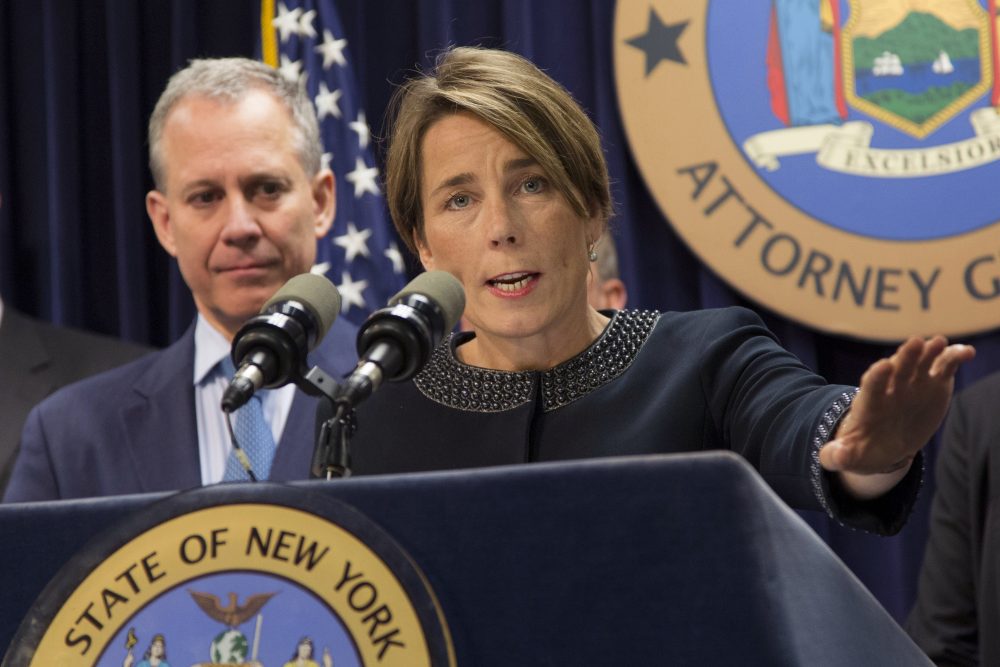Advertisement
Mass. AG Healey Faces Legal Battles Against ExxonMobil In Boston And Texas Courts
Resume
Massachusetts Attorney General Maura Healey wants ExxonMobil to turn over 40 years of internal documents, claiming the records will show the oil company knew decades ago that its fossil fuel products caused climate change.
By not telling Massachusetts customers and investors about this, Healey charges the company violated state consumer protection law that prohibits unfair and deceptive business practices.
The investigation is the focus of two court fights — one in Boston and another in Dallas; a federal judge has ordered Healey to appear in Dallas court next week to answer questions about her investigation into ExxonMobil.
The Legal Battle In Massachusetts
On Wednesday, the oil company challenged the attorney general's case in Suffolk County Superior Court in an attempt to quash — or at least stall — the investigation. Exxon's legal defense is a strongly worded offense.
"ExxonMobil is going to vigorously defend itself against these politically motivated, biased investigations," said attorney Justin Anderson, who represents ExxonMobil. "We will defend the climate change research that was done and the communications that were made with consumers and investors, because there is nothing misleading or false about them."
Suffolk Superior Court Judge Heidi Brieger presided over the hearing. The courtroom was packed, but Healey did not attend.
Anderson argued that the Massachusetts case should be stayed, pending the outcome of the federal suit in Texas. In that case, Exxon is turning the tables on Healey. The company wants to turn Healey's investigation of Exxon into an investigation of Healey and her motives.
Anderson also charged the AG's case violates Exxon's constitutional right to free speech because it has a chilling effect on what the company can say.
Besides, Anderson said, Massachusetts doesn't have jurisdiction over ExxonMobil because the oil company doesn't directly sell products here.
But Anderson conceded ExxonMobil did sell its products to the state police.
"The idea that we've sold motor oil to the state police, that one has problems of its own, just on the merits," he said.
Anderson said the state police is a government agency — not a consumer — so no harm done, no fraud or deception.
There are more than 300 ExxonMobil service stations in Massachusetts, but Anderson claims they're owned by franchisees, not Exxon.
Richard Johnston, who represented the AG in court, wasn't buying the argument.
Advertisement
"Frankly, it seems astounding to our office — and I suspect it would be astounding to some members of the public as well — that a company, which is the largest publicly held oil and gas company in the world, is not conducting business in Massachusetts and feels it would be unfair for it to have to defend itself in the courts of Massachusetts," he said.
Last year, the online investigative organization InsideClimate News was a Pulitzer Prize finalist for its nine-part series that showed Exxon had been aware of its products' impact on climate change for decades. The reports were based on company documents that are among those that Healey is now trying to obtain.
But while the news reports may have swayed the court of public opinion, the Massachusetts attorney general's case against Exxon is facing a tough fight in the legal courts in Boston and Texas.
Judge Brieger said she's taking the matter under advisement but gave no indication when she'd announce a decision.
Correction: An earlier version of this story incorrectly stated that an attorney for ExxonMobil "conceded Massachusetts did sell its products to the state police." He conceded that ExxonMobil sold its products to the state police. We regret the error.
This article was originally published on December 08, 2016.
This segment aired on December 8, 2016.
